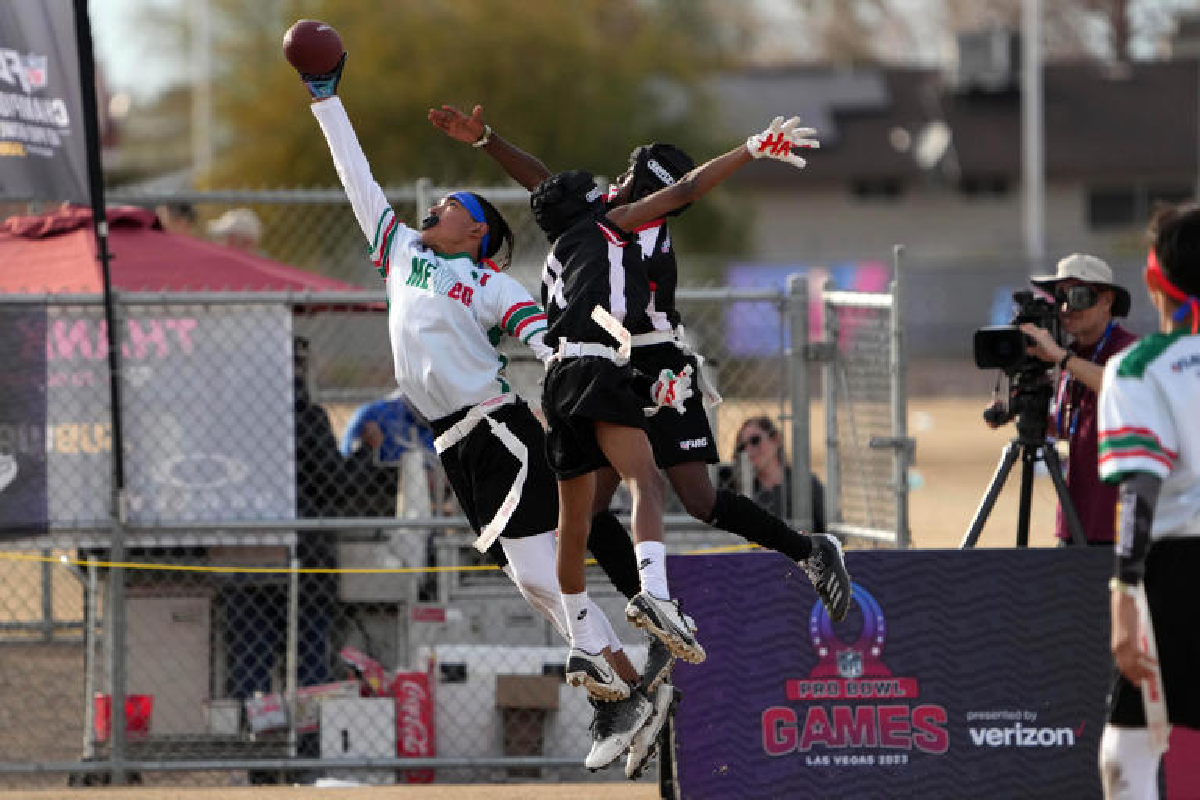By Chris Bumbaca, USA TODAY
Flags are everywhere on the football field during NFL Pro Bowl weekend in Orlando, Florida.
These aren’t penalty flags. They are the ones worn around waists.
“The NFL has made this a priority,” Izell Reese, CEO of RCX Sports, the sole operator of NFL FLAG, told USA TODAY
NFL Pro Bowl participants will play the flag version of football Sunday for the second consecutive year. Prior to that contest, the league once again hosted the International NFL Flag Championships – featuring teams from 12 countries – Saturday.
“It just shows the full range of what flag football is,” said NFL international flag football development and youth marketing manager Afia Law said.
Olympic impact on NFL’s flag football efforts
Flag football received its biggest vote of acceptance last fall when the Los Angeles 2028 Summer Olympic committee announced the inclusion of the sport on the program. Whether NFL stars will participate is a question that will be worked out over the coming year, NFL vice president of football development Roman Oben said. Those discussions are still developing.
“When you say the tackle football side is taking flag seriously as a growth sport, as a good layer of participation for future players and future plans, I think that’s a step in the right direction in terms of where the NFL belongs in the discussion,” Oben told USA TODAY Sports.
Young people having a stage to which they can aspire is what will continue to drive the growth of flag, Reese said.
“I think it establishes the sport of football – in this case, flag – and puts it on another level,” Reese said.
Kids across the world, the NFL hopes, can play in the park with friends or on the blacktop at school while having the option to pursue a more competitive path all the way to the Olympics.
“I think it’s given us something that young people in the sport have wanted for some time, and it now presents that full pathway,” Law said.
Will NFL players play flag football in Olympics?
Oben expects by early 2025 key stakeholders – owners, players’ union and the International Olympic Committee – would have at least established a clear path of communication to decide whether NFL players can participate. The Olympic schedule means competition would take place during training camp. The injury risks are obvious.
Also: there would have to be some sort of selection process, similar to how USA Basketball evaluates NBA and WNBA stars.
“You have to try out for the Olympics,” Oben said.
Different skills, rules – and a lesser barrier to entry
Flag football is a sport within itself, Law said. It is speedier, more agile and is played on a smaller field compared to the tackle version. Flag also has more co-ed possibilities. Size and strength are secondary attributes.
Helmets and shoulder pads are also unnecessary.
“Given that ease of getting equipment – flag belts and footballs – enables young people to try something they may not otherwise get to try,” Law said. “So I think it helps massively.”
Flag is feasible, while tackle football may be impossible in some places domestic or abroad. Being able to just play without the additional effort of acquiring equipment eases the transition “especially in certain parts of the world where there are more barriers to enter sport,” Law said.
There are no offensive or defensive lines. Players have the ability to “find their skill and what they’re good at and what they contribute to the team,” Law said. And that allows all individuals to have their own unique football journeys, Oben said.
“We live in an era where recreational sports are marginalized if you’re not on some travel team by fourth grade … from a flag football perspective, we take all comers,” he said.
International and domestic growth
All 32 NFL clubs have flag initiatives within their markets and have started expanding their growth internationally, Oben said.
NFL FLAG is the largest organized flag league in the world. There were 300,000 members in 2019 and that number has jumped to 700,000 now. There are adult leagues and divisions for children as young as five. Eight states (Alabama, Alaska, Arizona, California, Florida, Georgia, Nevada and New York) have sanctioned girls’ flag football as a varsity sport, while the NCAA sanctioning process is underway (it has already been approved by the NAIA and junior colleges).
“Obviously, there’s been a lot of groundswell growth,” Reese said.
In Mexico, 100,000 new players came to flag in 2022. Japan has included flag football in the national curriculum of its elementary schools. Nearly 200,000 children play in China’s schools. The sport is gaining traction in Caribbean countries, Reese said, like the Bahamas.
“Excitement from the community backyard,” Oben explained, “to being played in the Olympics one day.”
This article originally appeared on USA TODAY: NFL takes flag football seriously. Pro Bowl highlights growing sport that welcomes all

